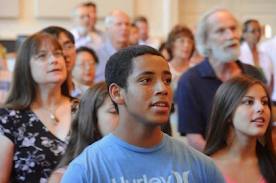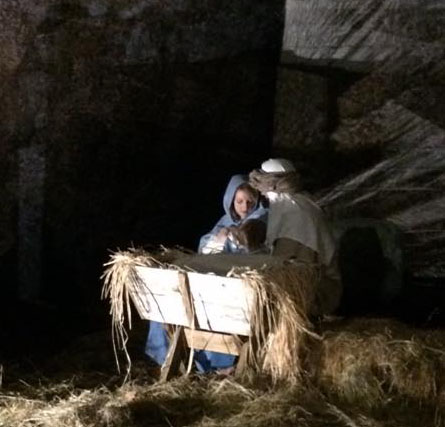Background Passages: Luke 9:57-62 and Philippians 3:12-14
The big day had finally come. To a young boy growing up in the 1960s on a cotton farm, each day brought a series of chores to be done. Most were routine and boring. Those I deemed “exciting,” like jumping on the tractor and plowing the field, were the privileges of age and responsibility. When deemed old enough and responsible enough, my Dad entrusted me with an old, yellow Case 400 tractor and a plow called the “lister.” We used the lister to prepare the fields for planting. By tilling the soil in this way, we cleared the field of weeds and old stalks and built the furrows and ridges, or “beds,” necessary for planting.
Hoeing the field, slopping the hogs, moving the irrigation pipe were mind-numbing work. Driving the tractor stood as a rite of passage…at least it was to this 12-year-old boy. Listing was one of the first “real jobs” my Dad assigned me as I was growing up. “Real” being defined as anything involving a tractor and plow. I remember burying my excitement in a cover of feigned indifference, but inside, I was pumped.
As I drove the tractor to my assigned field, Dad followed in his dusty Dodge pick-up. When we arrived, he jumped from the truck and showed me where he wanted me to begin. He explained the hydraulics and showed me how to drop the disk to mark the next row. Dad set the disk and drove the first few rows, straight as an arrow, with me riding along watching…a “do as I do” moment.
Listing was one of the first steps in the annual farming process. The planter followed the rows created by the lister. The cultivator followed the planter as the cotton grew to remove weeds and mix and incorporate the soil to ensure the growing crop had enough water and nutrients to grow well. So, if the rows created by the lister were not straight, it made the field difficult to work.
I should note that the rows my Dad plowed as my template looked as if they were drawn by a ruler. Straight as an arrow stretching a quarter mile across our West Texas farm. He had a knack for it.
The task appeared simple to me. Align the front wheel of the tractor with the line drawn by the disk and my rows would be as straight as Dad’s. As he climbed off the tractor and bounded toward his truck before leaving me alone to my work, he told me to concentrate on the line ahead of me and “don’t look back.”
Looking behind you as you plowed was the surest way of getting off line. I scoffed inwardly at Dad’s advice. How hard could it be to drive in a straight line?
It turns out that laying that perfect row requires concentration a 12-year-old boy finds difficult to maintain. I remember spending a great deal of time looking behind me, checking on my progress. Every wiggle I saw heightened my anxiety about the quality of work, compelling me to look time and time again where I had travelled.
The more I worried with it, the worse it looked. My quarter mile rows meandered through that red soil like a copperhead snake. Dad laughed when he saw it. I eventually learned the lesson he taught though I was never quite as good as he was.
God reminded me of that moment in my childhood as I read a passage in the Gospel of Luke. It seems Dad’s lesson about farming was as old as the Bible and applies just as neatly to life.
The crowd that followed Jesus generally included his closest disciples and others whose hearts were captured by Jesus message and ministry. They professed a faith in him and a desire to follow wherever he led them. As the 12 disciples discovered, the requirements of discipleship must be wholeheartedly embraced if we are to live to the fullest the life he wills for us.
One day as Jesus journeyed down the road followed by an interested crowd. A man came to Jesus pledging to follow him. Jesus needed him to think seriously about the commitment he was making. Jesus had “no home, no place to lay his head.” Following him meant a life of sacrifice and uncertainty. Jesus wanted more from the man than an ill-considered impulse decision that circumstance made hard to sustain. Count the cost, Jesus suggested, before you make a snap decision.
Jesus called out to a second man in whom he saw great promise. “Follow me.” Though willing, the man felt torn by the needs of his family and the responsibilities of discipleship. Jesus told him to get his priorities straight. God’s call required complete devotion to God.
The third man provoked a harsher response from Jesus. The man promised to follow Jesus but asked for time to say goodbye to those he loved, his heart divided between his desire to do as God asked and his love for his family and friends. He said, “No one who puts his hand to the plow and looks back is fit for service in the kingdom of God.”
The Greek words translated for “looks back” paint a picture of one constantly and continuously looking back at what he left behind. A picture of someone reluctant to let go of the things of the world rather than to fully commit life to God. The more we look back, the more likely we are to walk a wavering line of faith life that constantly strays from the path God intends for us.
The lesson for those of us who follow Christ emerges clearly in the conversation Jesus had with the three would-be followers. We must give ourselves completely to the call of Christ by counting and embracing the cost of discipleship and making God’s work the most important thing in our life. Following Christ has never been easy, but doing so in a fractured world that demeans and diminishes faith grows even more difficult. It is made harder when important things of life pull and tug at us from every direction. We must follow Christ despite the hardships, heavy hearts and home ties that block us from giving ourselves completely to him.
God calls us to put our hands on the plow and get on with the work of faith, creating a straight row that makes it easier for him to accomplish his future work. Human nature and the subtle work of a tempter compel us to look back upon the mistakes we’ve made, those sins in our lives that seek to convince us that God cannot possibly use such a flawed vessel?
Certainly, it may be good to glance behind us on occasion, to revisit our mistakes, as a reminder of how easy it is to fail God. Yet, to dwell in the misery of our past failures inhibits our ability to be useful in service ministry, makes us feel unworthy of the purpose to which we have been called.
Just as troubling are those times when we think wistfully of the “good ol’ days” when life and faith were easier. Today is the time we have been given. Looking back and wishing the world were different prohibits us from seeing in front of us the God-directed opportunities that allow us to demonstrated his love for a world that can no longer plow a straight row.
Don’t look back, Christ says. Give yourself wholly to your call and count the cost. Christ cannot accept our conditional or half-hearted service. Nor can we spend more time looking back at our past, reveling in a simpler time or lamenting our failures. He asks us instead to look forward; to press on. To open ourselves to the possibilities of service and ministry.
Paul captured the same message in his letter to the Philippian church as he declared that he could not fully grasp all that God called him to be. “Brothers, I do not consider myself to have embraced it yet. But this one thing I do: Forgetting what lies behind and straining forward to what lies ahead, I press on…”
*
Experience is a great teacher. I eventually learned to rely upon that handy, pivoting disk on the plow that I raised and lowered as I traversed the field. If I kept my eyes fixed on the line as it ran into the distance, put my tractor wheel in its furrow and followed it to the end, my rows rarely wavered.
For those committed to Christ, Jesus drew the line in the sand with his life as the perfect example to follow. Most of us recognize that our line drifts away from the line Jesus walked. Our mistakes compound when we spend too much time looking behind us. Let’s keep our eyes focused constantly on him and the path of righteousness he walked as an example to all of us.
I promise, it will make the rest of life that much easier to plow.









